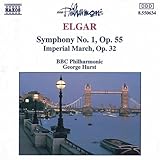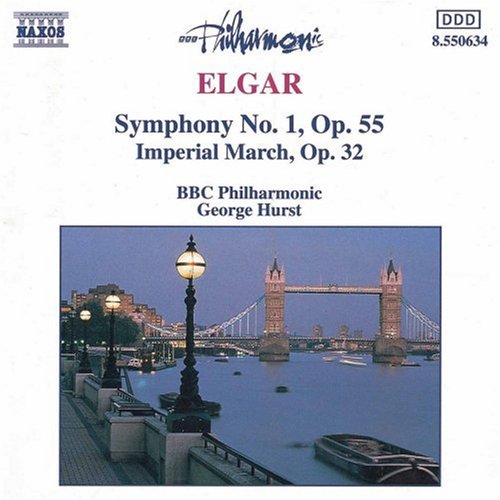Disco de Sir Edward Elgar: «Elgar: Imperial March / Symphony 1»

- Valoración de usuarios: (4.0 de 5)
- Título:Elgar: Imperial March / Symphony 1
- Fecha de publicación:1994-01-28
- Tipo:Audio CD
- Sello discográfico:Naxos
- UPC:730099563420
- 1Imperial March, Op.32
- 2Sym No.1 in A Flat, Op.55: Allegro
- 3Sym No.1 in A Flat, Op.55: Allegro Molto
- 4Sym No.1 in A Flat, Op.55: Adagio
- 5Sym No.1 in A Flat, Op.55: Lento - Allegro
This may not be the best Elgar 1st ever committed to disk (I would go to Previn's on Philips or Otaka's on Bis for that), but it is excellent value for the money.
The BBC Phil has now reached world class stature, and no one can complain about their playing. I find Hurst a little loose and discursive in the first movement, but the slow movement is rapturously beautiful and relaxed, while the finale, by contrast, is bold and vigorous--downright powerful at the end.
The March is agreeable filler--rarely recorded, not a great piece, and very brief (about 5 minutes--but very well presented here.
Sound is not audiophile levels, but totally competitive. You can't go wrong at the Naxos price.
George Hurst's approach to the first symphony might understandably be criticized for being superficial, yet there is much to enjoy here. The first movement is elegantly swaggering, but with a surprisingly strong sense of purpose. The performance of the slow movement is, perhaps, the weakest on the disc, with little depth and not a perfect sense of structure, although it sounds beautifully. The Allegro Molto is not completely successful either - true, the secondary material is wonderful, but the more troubled fast material completely lacks the urgency of, say, Slatkin. The finale does perhaps lack a sense of purpose as well, but here Hurst at least never fails to grab one's attention, and he brings out some superb playing from the orchestra. Indeed, the playing is thoroughly satisfying and the recording quality excellent - this release gives absolutely no indication of being any hurried and scrappily played budget option. But as indicated, it isn't really a front-runner either. The Imperial March is as well played as on any alternative recording (not many of them), but for the main course I'd still go for Slatkin (among modern versions, at least).

